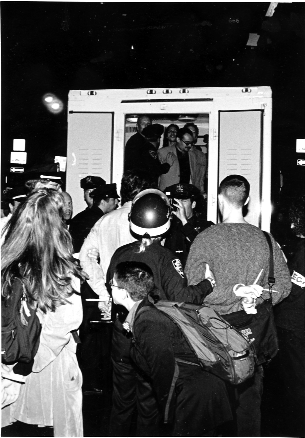Federal court denies claims from NYC arrests following gay college student murder
A federal appeals court in Manhattan has ruled against the constitutional claims of seven individuals arrested and held for various lengths of time on the evening of October 19, 1998, during a vigil in honor of Matthew Shepard, the young gay man who was tortured and left to die a few days earlier in Wyoming.
On April 5, the federal appeals court approved a trial court ruling that the police procedures followed on that occasion did not violate the federal constitutional rights of those arrested.
The spontaneous participation of more than 4,000 people surprised organizers and as the crowd tried to march down Fifth Avenue from the park across the street from the Plaza Hotel toward Madison Square Park, the New York Police Department responded in large numbers. As marchers spilled out into early evening rush hour traffic on Fifth Avenue, 115 people were arrested.
Some observers contended that the police overreacted in their response to the large crowd. The event organizers had requested no police permit.
Seven of the arrestees—Timothy Bryant, Maurice Cassidy, Joseph Defilippis, Jessica Dyson, Leonard Gay, Robert Takacs and Ulrik Trojaborg—claiming that they should have been issued desk appearance tickets (DATs) and released immediately, filed a federal lawsuit, claiming their post-arrest detention violated the 14th Amendment’s due process clause, and also asserting violations of state law, such as false arrest and assault. They were represented by two lawyers well known for their work on civil rights matters—James Reif and Daniel Alterman.
Police officers have discretion to decide whether to issue a DAT instead of having the arrestee taken to the police station, booked and held for arraignment. On this occasion, apparently, the word quickly went out to the police on the street that there would be no DATs issued; every arrestee was to be held and booked. This policy was a recurrent pattern of police response to demonstrations during the administration of former Mayor Rudolph Giuliani. Louis Anemone, then chief of the department, testified in a deposition that he had personally taken charge at the scene when the numbers of people turned out to be so large and explained the arrest policy.
“The group, from my perspective, was a violent mob,” Anemone testified. “It was out of control. There was very little leadership, or any, that anyone on the police side could detect. So it’s the worst kind of a group to be handling and dealing with in an unrestrained manner… To me it was crystal clear that they should not be given the privilege of a desk appearance ticket because this would probably end up becoming a bigger problem for us later on that evening.”
Anemone explained the concern that anyone arrested and quickly released would just come right back into the demonstration.
In addition, DATs require a certain amount of on-the-spot paperwork that takes the officer away from the scene, and Anemone felt that he couldn’t spare the officers at that point.
Among the seven plaintiffs, however, some were arrested, but never charged, others were acquitted and one was given an adjournment that led to dismissal of the charges. In other words, none of the seven plaintiffs was ever actually convicted of violating the law, but each was in custody for at least several hours, and some were held overnight.
In a December 2003 decision, District Judge Lawrence McKenna found that the unexpected size of the crowd justified Anemone’s decision to forgo issuing DATs.
When the plaintiffs appealed, the city focused on Fourth Amendment precedent on search and seizure, in which the Supreme Court has adopted a rule of thumb that holding somebody more than 48 hours without charging them is probably unconstitutional except for the most unusual circumstances.
Writing for the appeals court, Judge Amalya Kearse found that none of the seven were held anywhere near that long, and some were held only a few hours. Since the court agreed with McKenna’s conclusion that the issuance of desk appearance tickets is discretionary and that the police had presented sufficient justification for not issuing them in this case, there was no valid federal constitutional claim.
Having dismissed the federal claim, neither McKenna nor the appeals court considered the state law claims.
gaycitynews.com


































